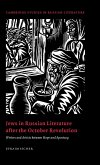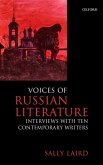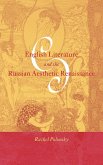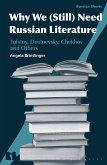Russian Literature and Cognitive Science
Herausgeber: Dolack, Tom
Russian Literature and Cognitive Science
Herausgeber: Dolack, Tom
- Gebundenes Buch
- Merkliste
- Auf die Merkliste
- Bewerten Bewerten
- Teilen
- Produkt teilen
- Produkterinnerung
- Produkterinnerung
This volume applies the newest insights from cognitive psychology to the study of Russian literature. Chapters focus on writers and cultural figures from the Golden to the Internet Age including: Pushkin, Dostoevsky, Tolstoy, Sologub, Bely, Akhmatova, Nabokov, Baranskaya, and contemporary online discourse.
Andere Kunden interessierten sich auch für
![Jews in Russian Literature after the October Revolution Jews in Russian Literature after the October Revolution]() Efraim SicherJews in Russian Literature after the October Revolution174,99 €
Efraim SicherJews in Russian Literature after the October Revolution174,99 €![Voices of Russian Literature Voices of Russian Literature]() Sally Laird (ed.)Voices of Russian Literature111,99 €
Sally Laird (ed.)Voices of Russian Literature111,99 €![English Literature and the Russian Aesthetic Renaissance English Literature and the Russian Aesthetic Renaissance]() Rachel PolonskyEnglish Literature and the Russian Aesthetic Renaissance129,99 €
Rachel PolonskyEnglish Literature and the Russian Aesthetic Renaissance129,99 €![Russian Literature and Empire Russian Literature and Empire]() Susan LaytonRussian Literature and Empire179,99 €
Susan LaytonRussian Literature and Empire179,99 €![The Routledge Companion to Russian Literature The Routledge Companion to Russian Literature]() Neil Cornwell (ed.)The Routledge Companion to Russian Literature154,99 €
Neil Cornwell (ed.)The Routledge Companion to Russian Literature154,99 €![Why We (Still) Need Russian Literature Why We (Still) Need Russian Literature]() Angela BrintlingerWhy We (Still) Need Russian Literature13,99 €
Angela BrintlingerWhy We (Still) Need Russian Literature13,99 €![Studies in Russian Literature Studies in Russian Literature]() Charles Edward TurnerStudies in Russian Literature45,99 €
Charles Edward TurnerStudies in Russian Literature45,99 €-
-
-
This volume applies the newest insights from cognitive psychology to the study of Russian literature. Chapters focus on writers and cultural figures from the Golden to the Internet Age including: Pushkin, Dostoevsky, Tolstoy, Sologub, Bely, Akhmatova, Nabokov, Baranskaya, and contemporary online discourse.
Hinweis: Dieser Artikel kann nur an eine deutsche Lieferadresse ausgeliefert werden.
Hinweis: Dieser Artikel kann nur an eine deutsche Lieferadresse ausgeliefert werden.
Produktdetails
- Produktdetails
- Verlag: Lexington Books
- Seitenzahl: 308
- Erscheinungstermin: 30. November 2024
- Englisch
- Abmessung: 238mm x 157mm x 22mm
- Gewicht: 585g
- ISBN-13: 9781666941692
- ISBN-10: 1666941697
- Artikelnr.: 71682445
- Herstellerkennzeichnung
- Libri GmbH
- Europaallee 1
- 36244 Bad Hersfeld
- gpsr@libri.de
- Verlag: Lexington Books
- Seitenzahl: 308
- Erscheinungstermin: 30. November 2024
- Englisch
- Abmessung: 238mm x 157mm x 22mm
- Gewicht: 585g
- ISBN-13: 9781666941692
- ISBN-10: 1666941697
- Artikelnr.: 71682445
- Herstellerkennzeichnung
- Libri GmbH
- Europaallee 1
- 36244 Bad Hersfeld
- gpsr@libri.de
Edited by Tom Dolack - Contributions by Tom Dolack; Denis Akhapkin; David Bethea; Ekaterina Chelpanova; Brett Cooke; David S. Danaher; Kelly Knickmeier Cummings; Katherina B. Kokinova; Anna A. Lazareva; Julia Lerner; Irina Meier; Sarah B. Mohler; Michal M
Preface
Introduction Tom Dolack
Chapter 1: Pushkin's "The Stationmaster": Morality Meets Sexual Selection
David Bethea
Chapter 2: Flow and Selfhood in Leo Tolstoy's Anna Karenina: A Case Study
of the Mowing Scene David S. Danaher
Chapter 3: Facial Imagery, Reader Visualization, and the Visual Ethics of
War and Peace Sarah B. Mohler
Chapter 4: A Multilevel Cognitive Approach to Pushkin Tom Dolack
Chapter 5: Staying Imperturbable in the Face of Fate: Alexander Pushkin's
Gothic Stories Conveying the Code of Honor in the Face of the Supernatural
Ekaterina Chelpanova
Chapter 6: (Un)Reading and the "Gappiness" of Context: Towards a New
Cognitive Reception Theory Katherina B. Kokinova
Chapter 7: Re-Visioning Despair: The Medical Gaze in Sologub's The Petty
Demon Kelly Knickmeier Cummings
Chapter 8: Autism in Nabokov's The Defense Brett Cooke
Chapter 9: Provocation and Pre-Diction: Terrorist Realism as a Narrative
Mode in the Russian Imperium's Prose 1862-1914 (Particularly in Andrei
Bely's Petersburg, 1913) Michä Mrugalski
Chapter 10: Mass Shooters as Underground Men of the 21st Century Irina
Meier
Chapter 11: Russian Cognitive Approaches for Studying Genres of
Contemporary Electronic Communication: Interpreting "Sincere Conversations"
in New Media Anna Novikova and Julia Lerner
Chapter 12: Dream (Re)Interpretation: Metaphors and Story Schemas in
Meaning Creation Anna A. Lazareva
Chapter 13: Intersections between Language, Social Norms, and Individual
Cognition in Natalya Baranskaya's A Week like Any Other Angelina Rubina
Chapter 14: Cognitive Aspects of Deixis and Semantic Poetics of Anna
Akhmatova and Joseph Brodsky Denis Akhapkin
About the Contributors
Introduction Tom Dolack
Chapter 1: Pushkin's "The Stationmaster": Morality Meets Sexual Selection
David Bethea
Chapter 2: Flow and Selfhood in Leo Tolstoy's Anna Karenina: A Case Study
of the Mowing Scene David S. Danaher
Chapter 3: Facial Imagery, Reader Visualization, and the Visual Ethics of
War and Peace Sarah B. Mohler
Chapter 4: A Multilevel Cognitive Approach to Pushkin Tom Dolack
Chapter 5: Staying Imperturbable in the Face of Fate: Alexander Pushkin's
Gothic Stories Conveying the Code of Honor in the Face of the Supernatural
Ekaterina Chelpanova
Chapter 6: (Un)Reading and the "Gappiness" of Context: Towards a New
Cognitive Reception Theory Katherina B. Kokinova
Chapter 7: Re-Visioning Despair: The Medical Gaze in Sologub's The Petty
Demon Kelly Knickmeier Cummings
Chapter 8: Autism in Nabokov's The Defense Brett Cooke
Chapter 9: Provocation and Pre-Diction: Terrorist Realism as a Narrative
Mode in the Russian Imperium's Prose 1862-1914 (Particularly in Andrei
Bely's Petersburg, 1913) Michä Mrugalski
Chapter 10: Mass Shooters as Underground Men of the 21st Century Irina
Meier
Chapter 11: Russian Cognitive Approaches for Studying Genres of
Contemporary Electronic Communication: Interpreting "Sincere Conversations"
in New Media Anna Novikova and Julia Lerner
Chapter 12: Dream (Re)Interpretation: Metaphors and Story Schemas in
Meaning Creation Anna A. Lazareva
Chapter 13: Intersections between Language, Social Norms, and Individual
Cognition in Natalya Baranskaya's A Week like Any Other Angelina Rubina
Chapter 14: Cognitive Aspects of Deixis and Semantic Poetics of Anna
Akhmatova and Joseph Brodsky Denis Akhapkin
About the Contributors
Preface
Introduction Tom Dolack
Chapter 1: Pushkin's "The Stationmaster": Morality Meets Sexual Selection
David Bethea
Chapter 2: Flow and Selfhood in Leo Tolstoy's Anna Karenina: A Case Study
of the Mowing Scene David S. Danaher
Chapter 3: Facial Imagery, Reader Visualization, and the Visual Ethics of
War and Peace Sarah B. Mohler
Chapter 4: A Multilevel Cognitive Approach to Pushkin Tom Dolack
Chapter 5: Staying Imperturbable in the Face of Fate: Alexander Pushkin's
Gothic Stories Conveying the Code of Honor in the Face of the Supernatural
Ekaterina Chelpanova
Chapter 6: (Un)Reading and the "Gappiness" of Context: Towards a New
Cognitive Reception Theory Katherina B. Kokinova
Chapter 7: Re-Visioning Despair: The Medical Gaze in Sologub's The Petty
Demon Kelly Knickmeier Cummings
Chapter 8: Autism in Nabokov's The Defense Brett Cooke
Chapter 9: Provocation and Pre-Diction: Terrorist Realism as a Narrative
Mode in the Russian Imperium's Prose 1862-1914 (Particularly in Andrei
Bely's Petersburg, 1913) Michä Mrugalski
Chapter 10: Mass Shooters as Underground Men of the 21st Century Irina
Meier
Chapter 11: Russian Cognitive Approaches for Studying Genres of
Contemporary Electronic Communication: Interpreting "Sincere Conversations"
in New Media Anna Novikova and Julia Lerner
Chapter 12: Dream (Re)Interpretation: Metaphors and Story Schemas in
Meaning Creation Anna A. Lazareva
Chapter 13: Intersections between Language, Social Norms, and Individual
Cognition in Natalya Baranskaya's A Week like Any Other Angelina Rubina
Chapter 14: Cognitive Aspects of Deixis and Semantic Poetics of Anna
Akhmatova and Joseph Brodsky Denis Akhapkin
About the Contributors
Introduction Tom Dolack
Chapter 1: Pushkin's "The Stationmaster": Morality Meets Sexual Selection
David Bethea
Chapter 2: Flow and Selfhood in Leo Tolstoy's Anna Karenina: A Case Study
of the Mowing Scene David S. Danaher
Chapter 3: Facial Imagery, Reader Visualization, and the Visual Ethics of
War and Peace Sarah B. Mohler
Chapter 4: A Multilevel Cognitive Approach to Pushkin Tom Dolack
Chapter 5: Staying Imperturbable in the Face of Fate: Alexander Pushkin's
Gothic Stories Conveying the Code of Honor in the Face of the Supernatural
Ekaterina Chelpanova
Chapter 6: (Un)Reading and the "Gappiness" of Context: Towards a New
Cognitive Reception Theory Katherina B. Kokinova
Chapter 7: Re-Visioning Despair: The Medical Gaze in Sologub's The Petty
Demon Kelly Knickmeier Cummings
Chapter 8: Autism in Nabokov's The Defense Brett Cooke
Chapter 9: Provocation and Pre-Diction: Terrorist Realism as a Narrative
Mode in the Russian Imperium's Prose 1862-1914 (Particularly in Andrei
Bely's Petersburg, 1913) Michä Mrugalski
Chapter 10: Mass Shooters as Underground Men of the 21st Century Irina
Meier
Chapter 11: Russian Cognitive Approaches for Studying Genres of
Contemporary Electronic Communication: Interpreting "Sincere Conversations"
in New Media Anna Novikova and Julia Lerner
Chapter 12: Dream (Re)Interpretation: Metaphors and Story Schemas in
Meaning Creation Anna A. Lazareva
Chapter 13: Intersections between Language, Social Norms, and Individual
Cognition in Natalya Baranskaya's A Week like Any Other Angelina Rubina
Chapter 14: Cognitive Aspects of Deixis and Semantic Poetics of Anna
Akhmatova and Joseph Brodsky Denis Akhapkin
About the Contributors








